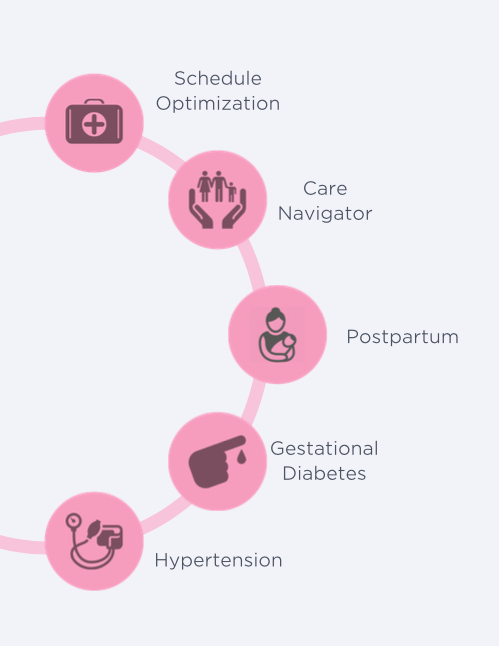
Background
Over the past roughly 40 years, prenatal care has been based on a standardized schedule: Pregnant women have been seen over 14 in-office visits spread throughout the three trimesters, up until delivery.
The original 14-visit schedule was introduced by the Institute of Medicine in the 1970s as a way to standardize care and improve pregnancy and birth outcomes. It is still recommended today by the American College of Obstetrics and Gynecologists (ACOG). However, studies have found limited evidence [1] of improved outcomes based on the 14-visit schedule. Moreover, it’s expensive. In fact, the cost of care has skyrocketed in recent years.
What is precision medicine?
Now, some experts say the standardized visit schedule is outdated and are recommending more personalized care as an alternative. Precision medicine is defined as an emerging approach to care that takes into account individual variability, including genetics, medical history, environment, and lifestyle factors for each patient, according to the National Institute of Health’s U.S. National Library of Medicine.
One example of how precision care is being used in the medical field today is with cancer patients. In the past, patients were given the same treatment as others with the same type of cancer. Today, doctors know that genetics play a role in how well an individual patient will respond to treatment. They are able to customize care based on genetic testing, saving time, money, and most importantly, lives.
During pregnancy, a precision approach can translate to high-risk patients needing more frequent care and monitoring from their care team, whereas low-risk pregnancies may be able to get by with fewer in-office visits. This is based on a number of factors including age, medical history, and genetics. Studies have found that a reduced schedule of visits among low-risk patients (usually every other month instead of every month until 28 weeks gestation) doesn’t translate to adverse maternal outcomes, including preterm delivery, preeclampsia, or low birth rate. However, more research is needed on perinatal mortality outcomes.
Interestingly enough, though, low-risk patients have reported they are less satisfied with their prenatal care when they are seen less. That’s understandable, especially for first-time moms who want updates and frequent communication with their care team. These patients want to know that everything is OK, and an in-person appointment every two months may not be enough to provide that reassurance.
Enter technology
That’s where technology and precision care can step in to fill the gap. The Babyscripts platform is a model for precision prenatal care. It’s not only designed for individualized and customized care, but for more frequent touch points between patient and provider.

Here’s why it works: Patients using the Babyscripts platform use a mobile app and a risk-based module to help monitor various risk factors (ex. blood pressure for hypertensives, or glucose levels for diabetics). Through the program, patient data is sent directly to their care team after tracking their weight, blood pressure and/or glucose levels at the recommended frequency. This is all done from the comfort of their own home, and it generates 30 times the amount of data typically captured in the office over the length of a pregnancy. This creates more opportunities for interventions and risk detections.
In-between appointments, patients also have access to their provider’s care plan through the Babyscripts app platform, along with gestation specific education to answer 95% of patient questions, and reduce the need to seek our “Dr. Google”. The care team can also leverage Babyscripts tools to push out real-time communication via weekly tips, emails and push notifications. This can be as simple as early pregnancy reminders to not smoke or drink, and to take prenatal vitamins, or as individualized as seasonal safety tips for pregnancy during the winter if someone lives in a colder climate, for example.
Can precision medicine lead to better prenatal outcomes?
There are several benefits to using a precision model for prenatal care. For the patient, frequent tracking, monitoring, and communication with their care team allow them to feel empowered about their pregnancy, even between appointments. The increased touch points and individualized monitoring is based on their own health history and risk factors, instead of a standardized schedule. This eliminates the problem of feeling isolated in-between appointments and the problem of feeling “just like a number” at a busy prenatal practice.
Additionally, studies have shown that patient satisfaction has increased with this kind of care model. Programs like Babyscripts have shown that patients feel more connected to their provider with a reduced face-to-face visit schedule and increased digital interactions.
For care teams, using precision methods also translates to a more individualized, precise, and holistic prenatal practice. Through platforms like Babyscripts, doctors are better able to assess individual risk through the data collected and offer monitoring and assessment of potential concerns, even between appointments.
Overall, the answer to improving prenatal outcomes for low-risk patients in the future is not going to come from increasing the frequency of in-office visits. Instead, one of the keys to improving is with more precise and individualized care.
To learn more, check out Inc.com’s coverage of Precision Prenatal Care.
References

Submit a comment